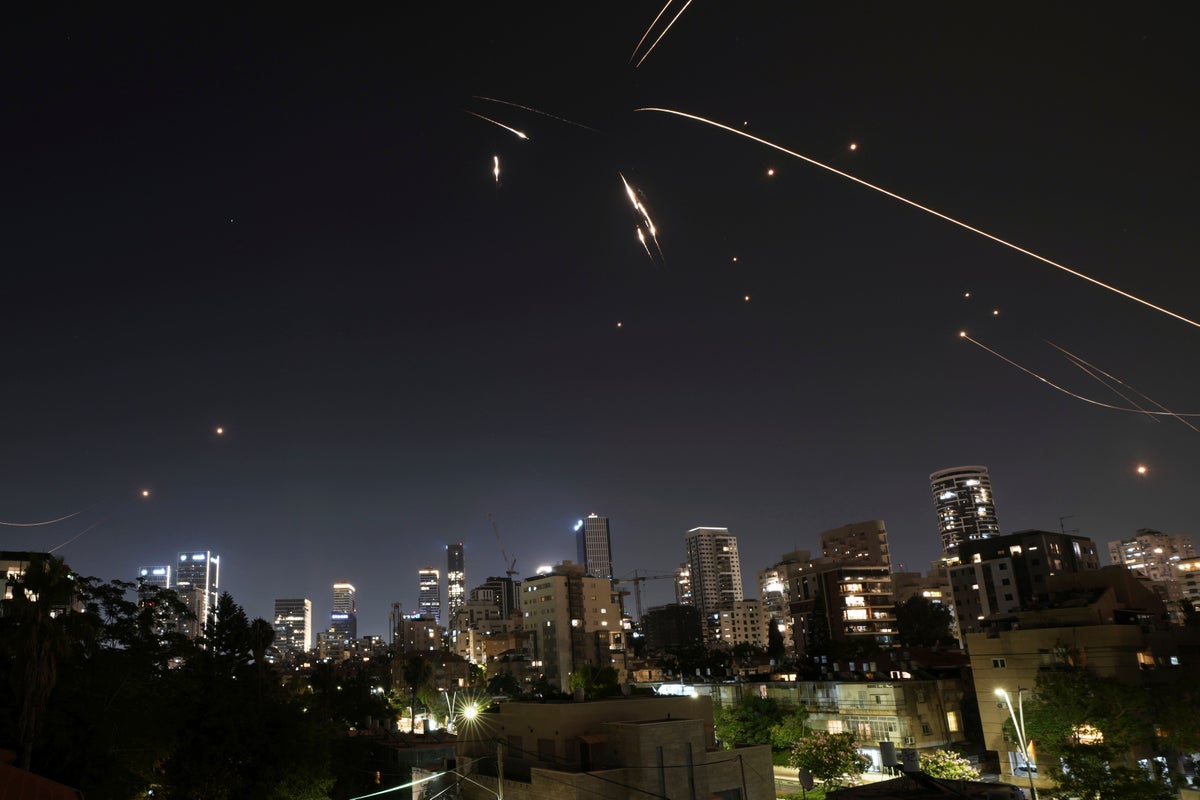
Iran bombarded Tel Aviv with hundreds of missiles overnight in retaliation for Israeli strikes on its nuclear bases.
Calls from Sir Keir Starmer and other world leaders for calm amid the mounting conflict appeared to fall on deaf ears, as Tehran struck back against Israel’s attacks.
Air raid sirens sounded out across Israel and its citizens were ordered to move into bomb shelters, as the attack began.
A plume of smoke could be seen rising from central Tel Aviv amid the barrage, after at least one Iranian missile appeared to bypass the iron dome missile defence system.
The rocket attacks on the Tel Aviv area wounded 34 people, according to Israel’s paramedic service, including one woman critically injured after being trapped under rubble.
Israel’s paramedic service said two people were killed and another 19 people were injured after Iranian missiles struck the central Israeli city of Rishon LeZion on Saturday.
A spokesperson for Beilinson Hospital said one woman was killed in a second Iranian barrage when a building was hit in Tel Aviv.
A spokesman for Iran’s Foreign Ministry said continuing nuclear talks with the US would be “meaningless” after the strikes, although he stopped short of saying the talks were cancelled according to The Mizan news agency.
Operation Rising Lion – the offensive against Tehran – has mainly targeted nuclear sites, including destroying the above ground section of Iran’s main Natanz nuclear base.
Hossein Salami, the leader of Iran’s Islamic Revolutionary Guard Corps, was among the senior Iranian figures reportedly killed in Israel’s initial overnight strikes.
Some 78 people were killed and more than 320 wounded in Iran, according to its ambassador to the UN.
The attack is believed to be the most significant Iran has faced since its war with Iraq in the 1980s.
Israel’s Prime Minister Benjamin Netanyahu said “more is on the way” in a video message released on Friday night.
Danny Dannon, Israel’s UN ambassador, claimed the operation was launched because Iran was “within days” of having the capability of building nuclear weapons.
Tensions between Israel, the US and Iran have escalated in recent weeks, amid negotiations over the Iran nuclear deal, which is aimed at preventing the country from developing nuclear weapons.
On Friday, Israel’s western allies attempted a diplomatic blitz aimed at cooling temperatures in the Middle East.
After convening a Cobra meeting of senior ministers and officials, Sir Keir spoke to Mr Netanyahu, urging him to de-escalate and work towards a “diplomatic resolution”.
The Prime Minister and US President Donald Trump agreed the burgeoning conflict needed to be resolved by “diplomacy and dialogue”.
And Sir Keir joined with France’s Emmanuel Macron and Germany’s Friedrich Merz in calling for restraint.
David Lammy, the Foreign Secretary, spoke to Iran’s foreign minister and urged calm, later warning the Middle East is facing a “moment of grave peril”.
Mr Trump has also suggested that Iran now had a chance to agree a nuclear deal to bring an end to the fighting.
On his Truth Social platform, the President wrote: “Two months ago I gave Iran a 60 day ultimatum to “make a deal”. They should have done it!
“Today is day 61. I told them what to do, but they just couldn’t get there. Now they have, perhaps, a second chance!”
Both the UK and the US have insisted they were not involved in the Israeli strikes and that Israel acted unilaterally.
The first time Israel discussed the strikes with the UK was at midday on Friday, according to Tzipi Hotovely, the country’s ambassador to the UK.
UN Secretary-General Antonio Guterres called for the attacks to be halted.
“Israeli bombardment of Iranian nuclear sites. Iranian missile strikes in Tel Aviv. Enough escalation. Time to stop. Peace and diplomacy must prevail,” he said in a post on X.
